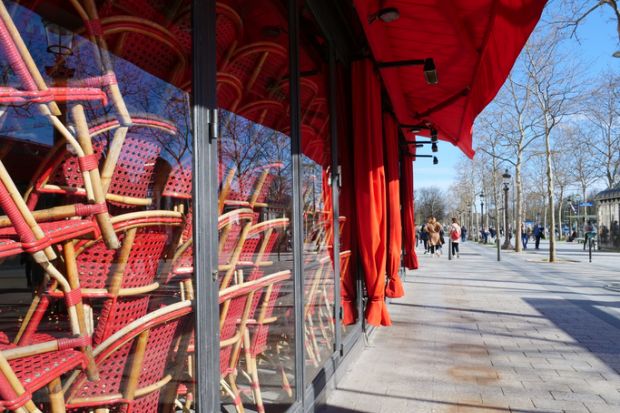French academics have condemned “appalling” budget plans that were set to cut €600 million (£500 million) from research and higher education, warning that the sector’s declining financial health will compromise France’s ability to compete.
The draft budget, on which the National Assembly was due to vote on 3 February, involves a €630 million reduction in higher education and research funding, with a €100 million cut to the National Centre for Scientific Research (CNRS) and €8 million pulled from financial support for students, including housing and scholarship support.
Last month, after universities highlighted financial pressures resulting from inflation and increased salary and pension contributions, the government assigned them an additional €100 million. The Ministry of Higher Education and Research said its budget, which totals €26.7 billion, “preserves research and supports universities”.
But the umbrella body France Universities said that institutions had “reached a tipping point”, and would be forced to take “problematic” measures including “closing degrees or university branches, reducing reception capacities [student places], reducing their service offerings, [and] freezing or postponing their investments while part of their real estate assets are dilapidated and energy-intensive”.
“The universities and research institutions were already starving,” the economist and Paris Dauphine University professor Élise Huillery told Times Higher Education, calling the draft budget “appalling”. France currently spends about 1.6 per cent of its gross domestic product on higher education and 2.2 per cent on research, she noted, the latter falling below the European Union target of 3 per cent.
Huillery said the finances of French universities have been “deteriorating for over two decades”, pointing to an almost 30 per cent increase in student numbers that has not been met with a similar increase in faculty or funding. “This structural underfunding has led to overcrowded classrooms, strained resources, and increased pressure on faculty,” she said. The 2025 budget, she added, “exacerbates this longstanding crisis, raising concerns about the sustainability of the system”.
While all disciplines are likely to feel the financial strain, Huillery said, “fields that rely heavily on laboratory work and specialised equipment, such as the sciences and engineering, may be particularly impacted”, because they need consistent infrastructure investment.
Students, meanwhile, could see their living conditions decline as a result of aid reductions, while at university they may experience “larger class sizes, reduced course offerings, and diminished support services as universities attempt to manage with decreased funding”.
“Opportunities for student involvement in research projects could decline, limiting their practical experience and exposure to cutting-edge developments in their fields,” Huillery said.
Françoise Combes, an astrophysicist at the Paris Observatory and professor at the Collège de France, told THE that “the competitiveness of France is affected, and it has been for years now” as a result of underfunding.
“We see the fraction of publications from France decreasing,” she said. “We see also the attractiveness for international researchers decreasing significantly.
“Of course, the country has a growing debt, and the deficit this year has reached a peak, so efforts have to be made by everybody.
“However, the higher education and research sector has suffered many cuts these past years, and is always cut more, since the impact is not seen in a short term, but in a longer term.”
She added: “This is not reasonable, since the research in the long term is our intellectual and economic future.”
Register to continue
Why register?
- Registration is free and only takes a moment
- Once registered, you can read 3 articles a month
- Sign up for our newsletter
Subscribe
Or subscribe for unlimited access to:
- Unlimited access to news, views, insights & reviews
- Digital editions
- Digital access to THE’s university and college rankings analysis
Already registered or a current subscriber?








